Imitation of Life; Proton Theatre: Written by: Kata Wéber
Direction: Kornél Mundruczó; Stage Design: Márton Ágh; Costume Design: Márton Ágh, Melinda Domán; Dramaturgy: Soma Boronkay; Cast: Lili Monori, Roland Rába, Annamária Láng, Zsombor Jéger, Dáriusz Kozma
The 59th edition of the International Theatre Festival MESS was opened with the performance Imitation of Life, by Hungarian film and theatre director Kornél Mundruczó, which shook the walls of the National Theatre Sarajevo to its foundations, also moving the drowsy audience by a few centimeters, after the summer break of theatre programming, through its social engagement, artistic spectacularity, an unusual theatre form, but also a direct relationship with reality and actual social subjects such as racism and poverty in Hungary. However, besides doing so in a metaphorical sense of course, the performance Imitation of Life has also done this quite literally, by turning the staged world upside down, over 360 degrees, after which everything seemingly stayed the same, but in actuality, nothing has. Not for the characters, and not for the audience.
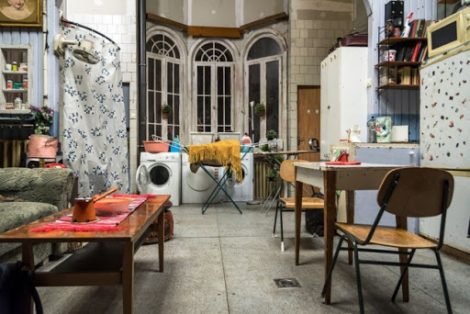
So, based on a journalist’s story about a assault of a young Roma boy in Hungary, in public transport, this Hungarian author of fantastical and illusionist realism, Kornél Mundruczó, creates a distrubing and powerful theatre piece about matters of identity, the banality of human life, the absolute absence of empathy, the inability to communicate without a thechnologic medium, a disoriented world that is spinning around in circles without purpose, and which doens’t mind the everyday man, and which twists and topples down his painstakingly constructed dreams.
The performance is opened with a shocking documentarian amateur interview recorded close-up and projected upon a wide canvas across the entire stage, in which a tortured and sickly face of mrs. Lőrinc Ruszó (Lili Monori) answers the questions from a man behind a camera, for which we find out soon that he is the uncompromising “executor” of the real estate company “Liquid” Mihály Sudár (Roland Rába), in charge of evicting her from the apartment. When trying to determine her identity in order to execute the eviction, after mentioning a months long avoiding of paying bills as the reason for “throwing her out on the street”, Sudár, provokes mrs.Ruszó, in a maner of a hardcore journalist or even a director, to the measure when this legal formality turns into a hard-to-watch shocking personal testimony.
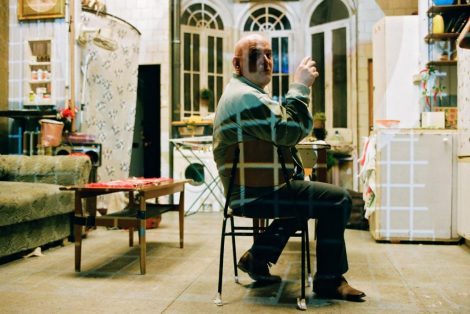
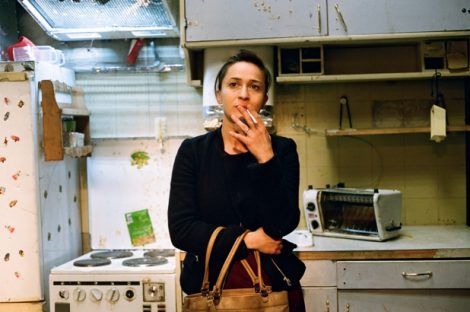
Instead of a name and surname i.e. the confirmation of identity, Sudár gets a detailed description of a difficult life of a Roma family in Hungary, principally referring to death, running away and hatred. As the participation of Sudár in the conversation gradually decreases, mrs.Ruszó goes deeper into the tragic nature of her fate, until ultimately she arrives at the matter of her son István (Zsombor Jéger), who ran away from home because of a fight with his father, and whose return she is now waiting for. After a half-hour-long monologue which, by content and duration had disturbed the audience, and even mrs.Lőrincz herself who, in bad health, leaves in front of the camera, the canvas is lifted, and from that reality, this whole space from their conversation is revealed thereby – a neglected, devastated apartment, shaped in a cube and staying against a dark backdrop, separated from the front part of the stage. While Sudár is heating up food in a microwave oven, mrs.Lőrincz loses consciousness and falls down to the living room floor. After finishing the aggressive and emotional interview, communication between the two continues in an intermittent, dry and cold way, which is an indication by the author to the inability of humans communicating face to face, without the mediation of technology. Opposed to this, Sudár’s texting with a colleague is carried out without problem, and even contains witty, heartfelt, and pictorial lines, which are presented to the audience on large screens in front of the stage and the scene. This is when something that resembles compassion is born, which becomes even more real when Sudár goes to pick up immobile mrs.Lőrincz from the floor and sits her down on the couch, than at the moment when he calls for an ambulance with no regard to him being there in charge of the eviction.
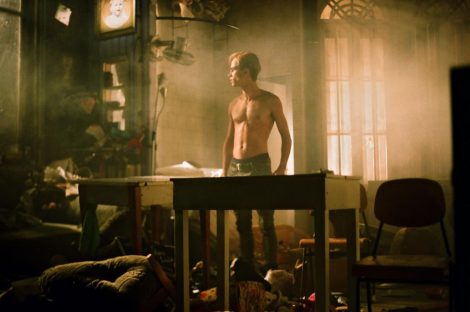
The executor leaves the apartment and for a moment, just for a moment, we get the impression that the unfortunate woman will keep her home, but before actually leaving he turns on the gramophone playing a suggestive song by Nina Simone, “Feeling Good”, announcing a “new dawn, a new day, a new life”. Confirming that the episode with “the crazy and sick Roma woman” is over, and that her story will be continued by another character, are terrifying film shots presented by the director on a cloud of smoke instead of a canvas, which seem like inserts from Mundruczó’s purely naturalist phase in film, with naked bodies, conflicts in dialogue with violent epilogues, running away from the camera, wherein we can hardly see the meeting of a mother and son who hasn’t been shown about in the interview. These shots/ghosts of a “hard life” of a recluse son who lives in a hotel and who earns a living as a prostitute are, in fact, foggy memories of the existence of a relationship, and that can only be preserved as part of stylised film shots. A “new day” is announced with sounds of thunder and a dark and threatening atmosphere with music by Ascher Goldschmidt, thus beginning a spectacular “intermission” some few minutes long, wherein the apartment, that was inhabited by people only a few moments ago, slowly turns and gradually transforms into a pile of worthless rubbish, thanks to the extremely innovative and rarely-seen feat in stage design by Márton Ágh. Although the “turnaround” itself seems like a movement from inside a spacecraft, the sudden crashing of items, kitchen appliances moving, drawers opening, and tables and chairs breaking proves the existence of gravity and confirms that the audience is still located on planet Earth. What caused the earthquake? Historical, social, political and even natural shifts from the “outer world”, or has Earth simply continued its continuous rotation, which is felt the most by those who are protected the least.
Famous for his filmography where he ties in the actual reality of his country, i.e. documentarianism, with fantasy, science-fiction, and even horror, Mundruczó doesn’t separate the worlds of theatre and film in this theatre piece either, but he further intertwines them by combining different genres, branches, and media. Again, this entire time he remains grounded within the actual moment of today’s society, and for example, he goes to create a funny critique of society or more precisely the health system in Hungary, where the ambulance takes 76 minutes to intervene with the operator saying that “the Hungarian people would perish, if they rushed to cases such as that one”.
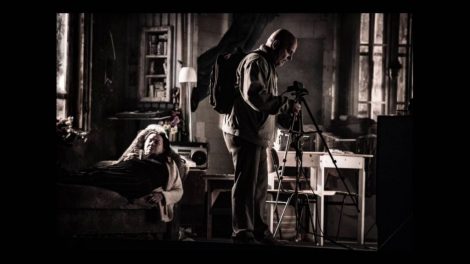
In this newly formed ruin of an apartment, a new life begins for Veronika Fenyvesi (Annamária Láng), who has to meet with the cunning Mihályo Sudáro before moving in, same as mrs.Ruszo. Although, as opposed to a Roma woman who, despite her fighting spirit, is not able to “trick” the state, Veronika succeeds in this thanks to belonging to a better standing social community and better knowledge of the “legal” framework with all its shortcomings. After the executor leaves believing that Veronka’s words where she states how she will be living alone and without smoking are true, she lights a cigarette and opens the door to her underage son played by Dáriusz Kozma.
At first, it’s clear that something is wrong in their relationship, considering the resemblance with the tone between her and the executor, and the fact that the boy doesn’t say a single word to her (except when whining after she takes away his phone) which definitely points to a years long alienation between mother and son, that is hard to fix among a pile of rubbish, without water or food.
While the audience (including the author of this review) decisively dedicated its attention to awaiting for something equally spectacular as the room’s “turnaround”, the director presented the completion of the work in the final scene of the performance, when the past and present merge in that post apocalyptic, gothic, magical, but also documentaristic space of the room. The ghost of the Roma son from those creepy shots from the past, switches to the present and enters the apartment where he meets Veronika’s son who tells him about mrs.Lőrincz passing. He gains a body form, but again, through the mediation of the camera (because minorities do not exist outside of the media), which then zooms into his face, while he is holding a samurai sword in his hands. This face, which is the same as his mother’s, the one starting the performance, is now rounding off this 360 degree circle of an imitation of life, together with a text screen which describes a case dating from 2005 when a young Roma boy was attacked with a samurai sword in Budapest and severely injured thereby, and despite claims of this attack being race-based, that has been concluded with a police report which reveals that the attacker also has a Roma background. Mundruczó’s “imitation of life” is not a literal imitation, but actually it’s a re-creation of everything which exists outside the aforementioned newspaper article, just the same as racism which had to be constructed from its foundations, and the history of which fits inside a small ruined apartment, wherein, instead of food, the tenants are dedicated to an everyday consumption of wretchedness, stinginess, angst, greed, and hypocrisy.
Written by: Mirza Skenderagić
Source: Mess

You must be logged in to post a comment Login